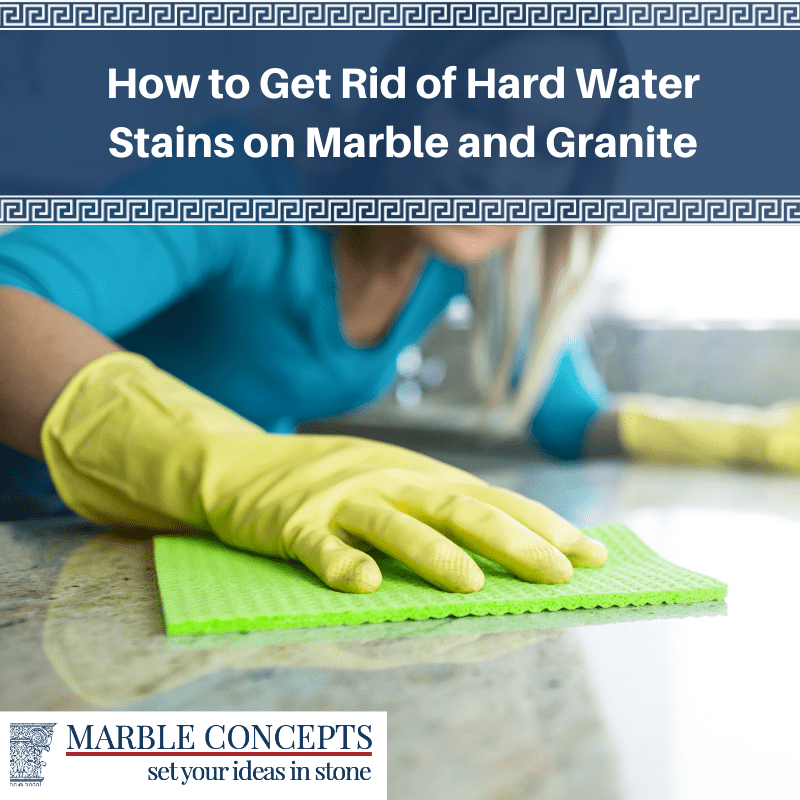When you imagine a luxury kitchen, you probably imagine it with countertops of either marble or granite. Nothing compares to the beauty of natural stone, after all. No wonder, then, that many homeowners are troubled when their marble or granite begins to look less than beautiful. If you are wondering why your granite or marble countertops are no longer looking as brilliant as before, we have one possible answer for you.
It could be hard water stains. Learning how to get rid of hard water stains is the first step to returning your natural stone counters to their former glory.
Let’s get started.
What Are Hard Water Stains?
Knowing how to tackle hard water stains means understanding key facts about hard water. Hard water is basically water that has high mineral content, such as magnesium and calcium. This means that a hard water stain is much more difficult to clean up than a regular water stain. You will commonly see signs of hard water around faucets, in the presence of a white, crusty ring. A regular water stain, for comparison, would either lighten or darken the material it affects.
Naturally, when hard water is allowed to pool and dry, it will dull the surface and even leave white markings behind. When it comes to granite and marble, hard water stains are the last thing you want to see.
Why Does Hard Water Stain Marble and Granite?
You might think that natural stone would handle the minerals in water better than it does, but that’s not the case. See, because stone like marble and granite are porous (with marble being the softer of the two) it leaves space for the minerals in the water to seep in. The longer you leave liquids on the countertops, the harder it will be to remove the water stains that develop over time.
Fortunately, there are various steps you can take to eliminate even the most stubborn of hard water stains from your marble and granite.
How To Clean Hard Water Stains From Marble and Granite
Take a look at the hard water stains marring your beautiful countertops. How bad is it? Do you have some dulling? Or is there a buildup? Depending on how pronounced the staining is, you may have to add some more elbow grease.
Regular water stains are easy. Just use a soft bristle brush and a mild detergent or designated granite cleaner. Viola! No more staining.
More stubborn hard water stains, though, require a little more. You will need to use baking soda and a soft bristle brush to do the job. All you need to do is make a poultice out of baking soda with a small amount of water to remove the staining. Apply the paste then scrub it away.
But of the most difficult of hard water stains, like those around faucets, you will need something a bit more to the point, like a razor blade or plastic scraper. It is very important that you are careful. Otherwise, you could puncture any sealants or even gouge out the stone.
Follow these steps:
- Using your putty knife or razor, gently scrape at the mineral deposits.
- Try to scrape the minerals away completely.
- Once you get enough of the minerals removed, you can make the baking soda poultice to help with any obstinate pieces of minerals.
- Wipe down the area with a sponge, rinse with fresh water, and then dry off with a towel.
Always dry off your marble and granite countertops, especially after cleaning them.
What Cleaners to Avoid
Again, marble and granite are porous. Therefore, you want to avoid any cleaners that could negatively impact the stone. For instance, never use an abrasive cleaning product in an attempt to scrape off hard water stains, because that could lead to scratching and etching. Furthermore, many common liquid cleaners have ingredients that are not safe for marble or granite. Any acidic ingredients will wear down the protective seal on your countertops.
Avoid using cleaners containing vinegar, lemon juice, or bleach. Windex is also not recommended.
Tips To Prevent Hard Water Stains on Marble and Granite
The best way to prevent staining from every happening is to apply a seal to your marble or granite. High-quality sealants are available from a trusted contractor or stone fabricator, but you can also find some at your local home improvement store. While seals are not complete protection from damages, they do a great job at preventing staining. You also have to perform routine maintenance on your marble or granite counter, too.
Ultimately, it comes down to keep your counters clean. Do not let water sit too long on the countertop. Regularly wash and dry the stone.
The Bottom Line
Learning about hard water stains and how to remove them will help you keep your granite or marble counters or vanities in perfect condition. Plus, pristine stone means a longer lifespan. Be sure to clean up standing water as soon as you notice it, and do not wait until the hard water stain can’t be ignored before tackling it.
Need more information about cleaning marble or granite? We’d love to answer all your questions. Contact Marble Concepts today by filling out the contact form or picking up the phone.






